Criminal Law Assignment: Case Studies, Omissions, and Insanity
VerifiedAdded on 2020/01/21
|11
|3860
|161
Homework Assignment
AI Summary
This criminal law assignment addresses two key questions related to criminal liability. The first question delves into the concept of omissions in criminal acts, exploring the legal implications of failing to act when a duty is present. It examines the doctrine of actus reus, the defense of insanity, and relevant case law such as Bratty v Attorney-General of Northern Ireland. The second question presents a case scenario involving a couple operating an animal farm and analyzes the elements of mens rea, including intention, recklessness, and negligence, to determine criminal liability. The assignment also considers the impact of actions and statements made in the scenario, evaluating whether they constitute criminal offenses under the law. The analysis includes discussions on relevant legal concepts, the significance of intent, and the application of case law to the presented facts.
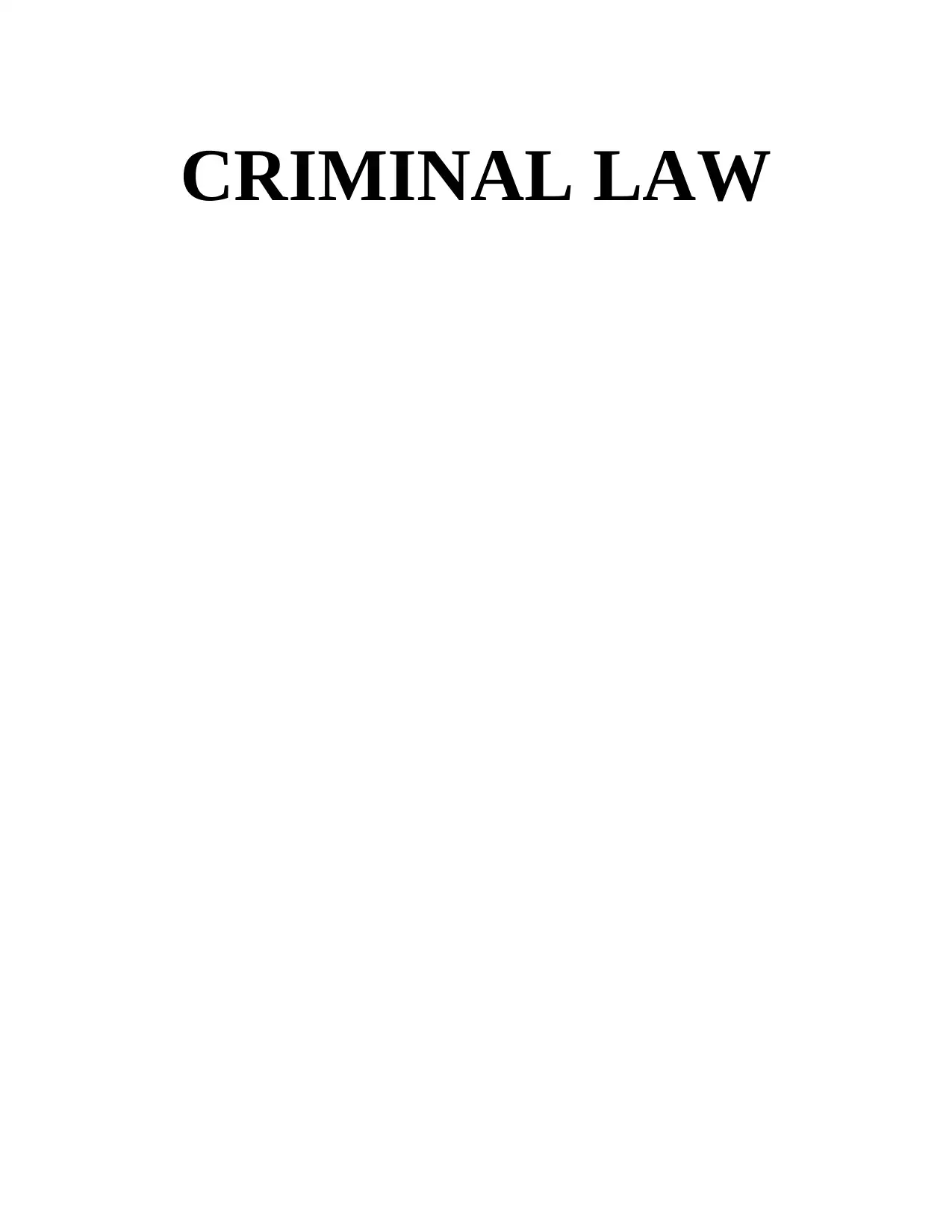
CRIMINAL LAW
Paraphrase This Document
Need a fresh take? Get an instant paraphrase of this document with our AI Paraphraser

TABLE OF CONTENTS
QUESTION 1...................................................................................................................................3
QUESTION 2...................................................................................................................................6
CONCLUSION..............................................................................................................................10
REFERENCES..............................................................................................................................11
QUESTION 1...................................................................................................................................3
QUESTION 2...................................................................................................................................6
CONCLUSION..............................................................................................................................10
REFERENCES..............................................................................................................................11
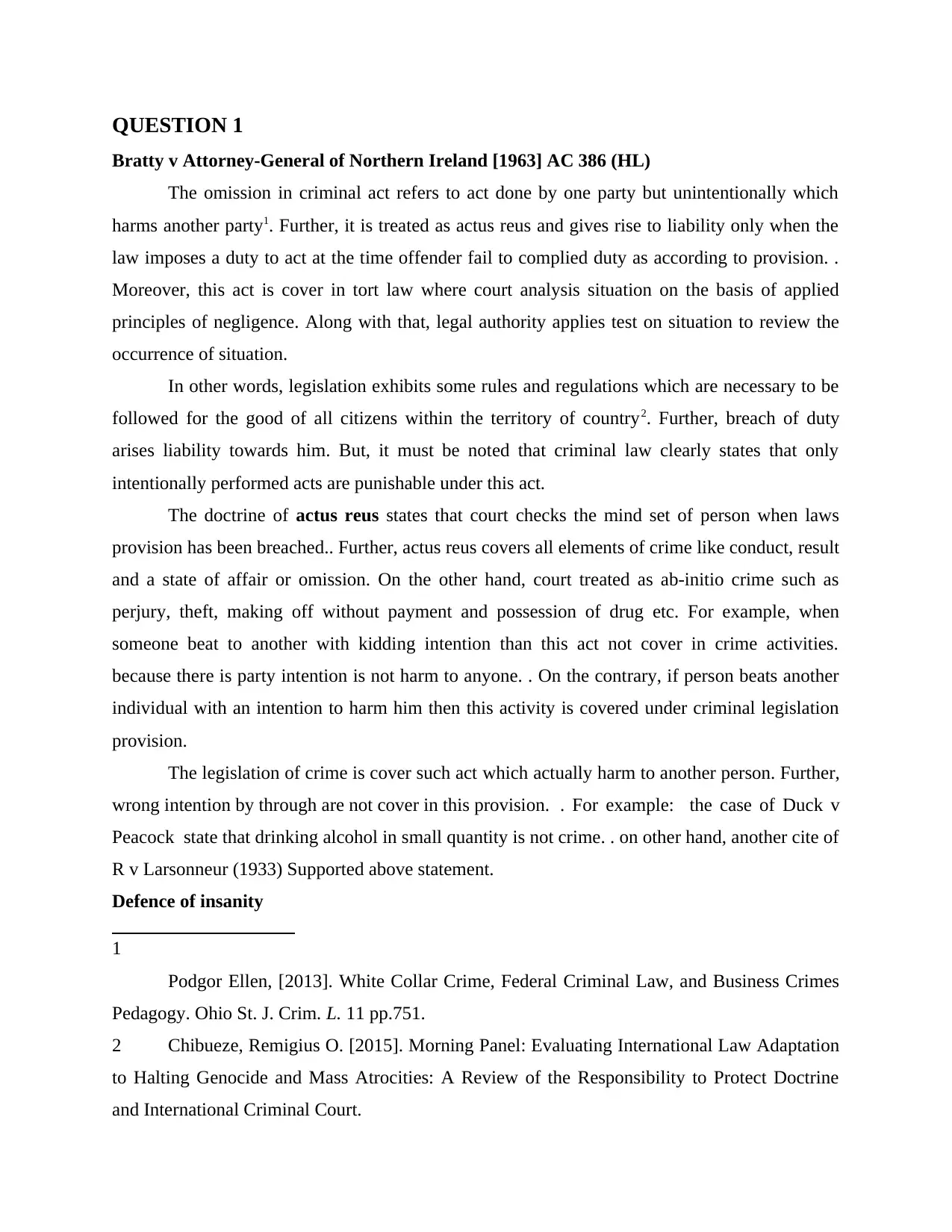
QUESTION 1
Bratty v Attorney-General of Northern Ireland [1963] AC 386 (HL)
The omission in criminal act refers to act done by one party but unintentionally which
harms another party1. Further, it is treated as actus reus and gives rise to liability only when the
law imposes a duty to act at the time offender fail to complied duty as according to provision. .
Moreover, this act is cover in tort law where court analysis situation on the basis of applied
principles of negligence. Along with that, legal authority applies test on situation to review the
occurrence of situation.
In other words, legislation exhibits some rules and regulations which are necessary to be
followed for the good of all citizens within the territory of country2. Further, breach of duty
arises liability towards him. But, it must be noted that criminal law clearly states that only
intentionally performed acts are punishable under this act.
The doctrine of actus reus states that court checks the mind set of person when laws
provision has been breached.. Further, actus reus covers all elements of crime like conduct, result
and a state of affair or omission. On the other hand, court treated as ab-initio crime such as
perjury, theft, making off without payment and possession of drug etc. For example, when
someone beat to another with kidding intention than this act not cover in crime activities.
because there is party intention is not harm to anyone. . On the contrary, if person beats another
individual with an intention to harm him then this activity is covered under criminal legislation
provision.
The legislation of crime is cover such act which actually harm to another person. Further,
wrong intention by through are not cover in this provision. . For example: the case of Duck v
Peacock state that drinking alcohol in small quantity is not crime. . on other hand, another cite of
R v Larsonneur (1933) Supported above statement.
Defence of insanity
1
Podgor Ellen, [2013]. White Collar Crime, Federal Criminal Law, and Business Crimes
Pedagogy. Ohio St. J. Crim. L. 11 pp.751.
2 Chibueze, Remigius O. [2015]. Morning Panel: Evaluating International Law Adaptation
to Halting Genocide and Mass Atrocities: A Review of the Responsibility to Protect Doctrine
and International Criminal Court.
Bratty v Attorney-General of Northern Ireland [1963] AC 386 (HL)
The omission in criminal act refers to act done by one party but unintentionally which
harms another party1. Further, it is treated as actus reus and gives rise to liability only when the
law imposes a duty to act at the time offender fail to complied duty as according to provision. .
Moreover, this act is cover in tort law where court analysis situation on the basis of applied
principles of negligence. Along with that, legal authority applies test on situation to review the
occurrence of situation.
In other words, legislation exhibits some rules and regulations which are necessary to be
followed for the good of all citizens within the territory of country2. Further, breach of duty
arises liability towards him. But, it must be noted that criminal law clearly states that only
intentionally performed acts are punishable under this act.
The doctrine of actus reus states that court checks the mind set of person when laws
provision has been breached.. Further, actus reus covers all elements of crime like conduct, result
and a state of affair or omission. On the other hand, court treated as ab-initio crime such as
perjury, theft, making off without payment and possession of drug etc. For example, when
someone beat to another with kidding intention than this act not cover in crime activities.
because there is party intention is not harm to anyone. . On the contrary, if person beats another
individual with an intention to harm him then this activity is covered under criminal legislation
provision.
The legislation of crime is cover such act which actually harm to another person. Further,
wrong intention by through are not cover in this provision. . For example: the case of Duck v
Peacock state that drinking alcohol in small quantity is not crime. . on other hand, another cite of
R v Larsonneur (1933) Supported above statement.
Defence of insanity
1
Podgor Ellen, [2013]. White Collar Crime, Federal Criminal Law, and Business Crimes
Pedagogy. Ohio St. J. Crim. L. 11 pp.751.
2 Chibueze, Remigius O. [2015]. Morning Panel: Evaluating International Law Adaptation
to Halting Genocide and Mass Atrocities: A Review of the Responsibility to Protect Doctrine
and International Criminal Court.
⊘ This is a preview!⊘
Do you want full access?
Subscribe today to unlock all pages.

Trusted by 1+ million students worldwide
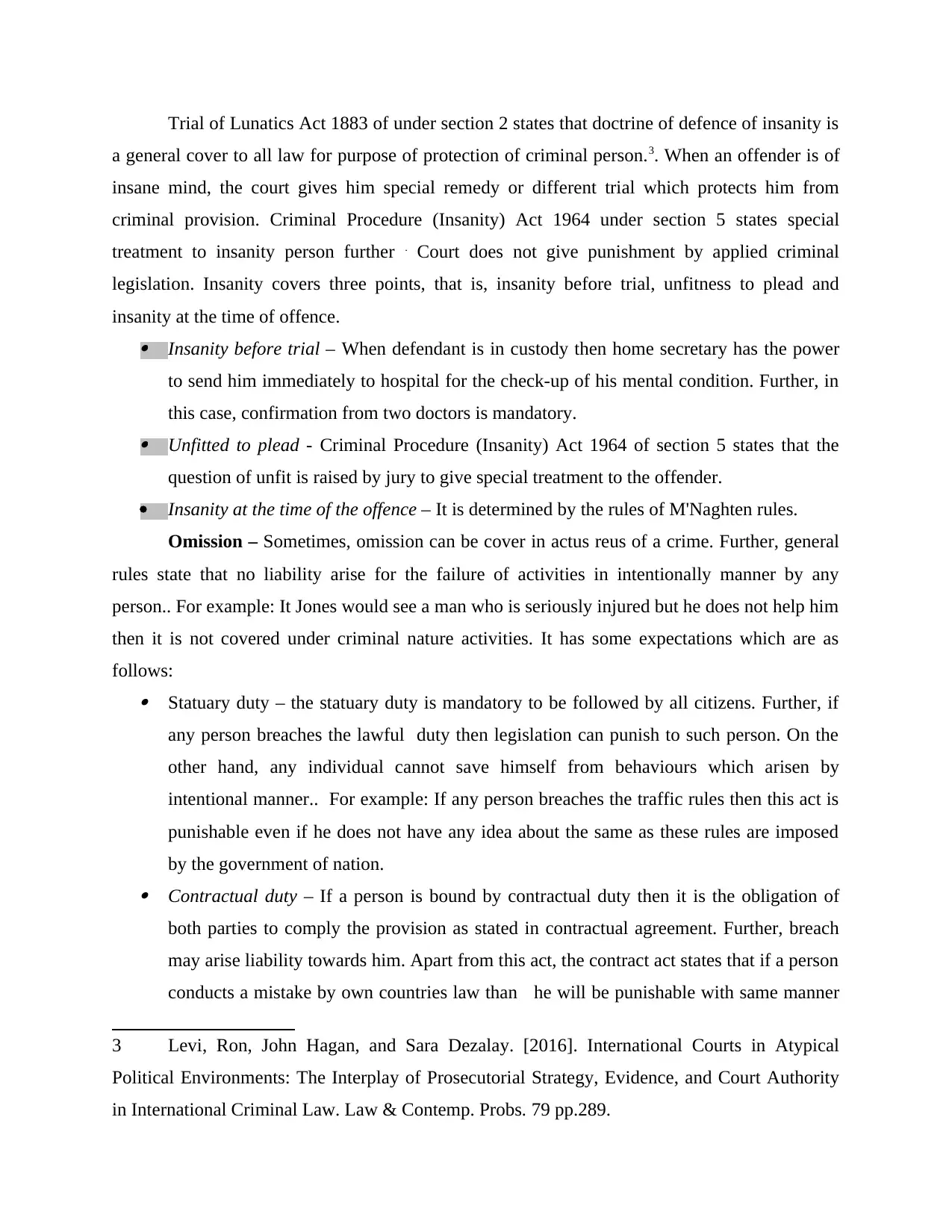
Trial of Lunatics Act 1883 of under section 2 states that doctrine of defence of insanity is
a general cover to all law for purpose of protection of criminal person.3. When an offender is of
insane mind, the court gives him special remedy or different trial which protects him from
criminal provision. Criminal Procedure (Insanity) Act 1964 under section 5 states special
treatment to insanity person further . Court does not give punishment by applied criminal
legislation. Insanity covers three points, that is, insanity before trial, unfitness to plead and
insanity at the time of offence. Insanity before trial – When defendant is in custody then home secretary has the power
to send him immediately to hospital for the check-up of his mental condition. Further, in
this case, confirmation from two doctors is mandatory. Unfitted to plead - Criminal Procedure (Insanity) Act 1964 of section 5 states that the
question of unfit is raised by jury to give special treatment to the offender.
Insanity at the time of the offence – It is determined by the rules of M'Naghten rules.
Omission – Sometimes, omission can be cover in actus reus of a crime. Further, general
rules state that no liability arise for the failure of activities in intentionally manner by any
person.. For example: It Jones would see a man who is seriously injured but he does not help him
then it is not covered under criminal nature activities. It has some expectations which are as
follows: Statuary duty – the statuary duty is mandatory to be followed by all citizens. Further, if
any person breaches the lawful duty then legislation can punish to such person. On the
other hand, any individual cannot save himself from behaviours which arisen by
intentional manner.. For example: If any person breaches the traffic rules then this act is
punishable even if he does not have any idea about the same as these rules are imposed
by the government of nation. Contractual duty – If a person is bound by contractual duty then it is the obligation of
both parties to comply the provision as stated in contractual agreement. Further, breach
may arise liability towards him. Apart from this act, the contract act states that if a person
conducts a mistake by own countries law than he will be punishable with same manner
3 Levi, Ron, John Hagan, and Sara Dezalay. [2016]. International Courts in Atypical
Political Environments: The Interplay of Prosecutorial Strategy, Evidence, and Court Authority
in International Criminal Law. Law & Contemp. Probs. 79 pp.289.
a general cover to all law for purpose of protection of criminal person.3. When an offender is of
insane mind, the court gives him special remedy or different trial which protects him from
criminal provision. Criminal Procedure (Insanity) Act 1964 under section 5 states special
treatment to insanity person further . Court does not give punishment by applied criminal
legislation. Insanity covers three points, that is, insanity before trial, unfitness to plead and
insanity at the time of offence. Insanity before trial – When defendant is in custody then home secretary has the power
to send him immediately to hospital for the check-up of his mental condition. Further, in
this case, confirmation from two doctors is mandatory. Unfitted to plead - Criminal Procedure (Insanity) Act 1964 of section 5 states that the
question of unfit is raised by jury to give special treatment to the offender.
Insanity at the time of the offence – It is determined by the rules of M'Naghten rules.
Omission – Sometimes, omission can be cover in actus reus of a crime. Further, general
rules state that no liability arise for the failure of activities in intentionally manner by any
person.. For example: It Jones would see a man who is seriously injured but he does not help him
then it is not covered under criminal nature activities. It has some expectations which are as
follows: Statuary duty – the statuary duty is mandatory to be followed by all citizens. Further, if
any person breaches the lawful duty then legislation can punish to such person. On the
other hand, any individual cannot save himself from behaviours which arisen by
intentional manner.. For example: If any person breaches the traffic rules then this act is
punishable even if he does not have any idea about the same as these rules are imposed
by the government of nation. Contractual duty – If a person is bound by contractual duty then it is the obligation of
both parties to comply the provision as stated in contractual agreement. Further, breach
may arise liability towards him. Apart from this act, the contract act states that if a person
conducts a mistake by own countries law than he will be punishable with same manner
3 Levi, Ron, John Hagan, and Sara Dezalay. [2016]. International Courts in Atypical
Political Environments: The Interplay of Prosecutorial Strategy, Evidence, and Court Authority
in International Criminal Law. Law & Contemp. Probs. 79 pp.289.
Paraphrase This Document
Need a fresh take? Get an instant paraphrase of this document with our AI Paraphraser
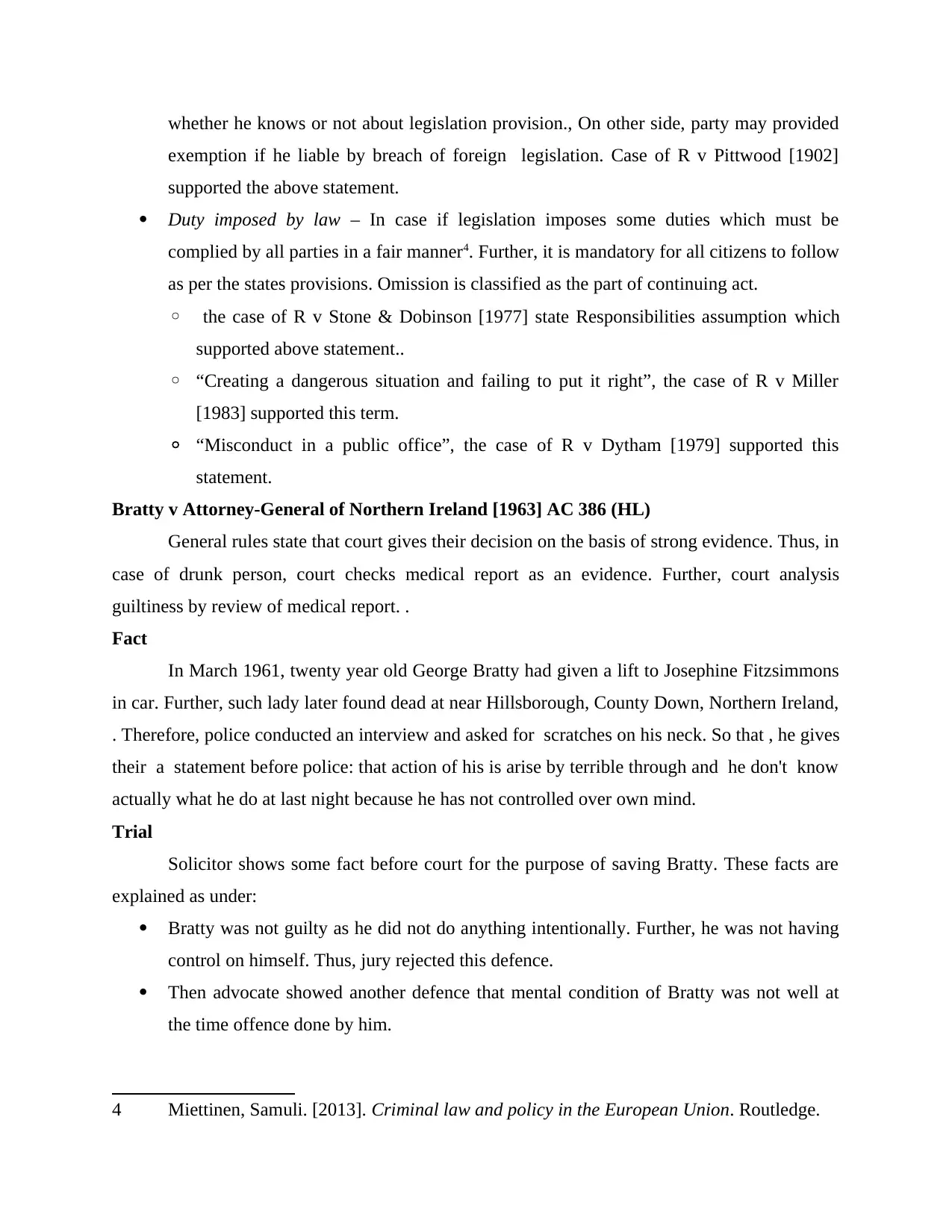
whether he knows or not about legislation provision., On other side, party may provided
exemption if he liable by breach of foreign legislation. Case of R v Pittwood [1902]
supported the above statement.
Duty imposed by law – In case if legislation imposes some duties which must be
complied by all parties in a fair manner4. Further, it is mandatory for all citizens to follow
as per the states provisions. Omission is classified as the part of continuing act.
◦ the case of R v Stone & Dobinson [1977] state Responsibilities assumption which
supported above statement..
◦ “Creating a dangerous situation and failing to put it right”, the case of R v Miller
[1983] supported this term.
◦ “Misconduct in a public office”, the case of R v Dytham [1979] supported this
statement.
Bratty v Attorney-General of Northern Ireland [1963] AC 386 (HL)
General rules state that court gives their decision on the basis of strong evidence. Thus, in
case of drunk person, court checks medical report as an evidence. Further, court analysis
guiltiness by review of medical report. .
Fact
In March 1961, twenty year old George Bratty had given a lift to Josephine Fitzsimmons
in car. Further, such lady later found dead at near Hillsborough, County Down, Northern Ireland,
. Therefore, police conducted an interview and asked for scratches on his neck. So that , he gives
their a statement before police: that action of his is arise by terrible through and he don't know
actually what he do at last night because he has not controlled over own mind.
Trial
Solicitor shows some fact before court for the purpose of saving Bratty. These facts are
explained as under:
Bratty was not guilty as he did not do anything intentionally. Further, he was not having
control on himself. Thus, jury rejected this defence.
Then advocate showed another defence that mental condition of Bratty was not well at
the time offence done by him.
4 Miettinen, Samuli. [2013]. Criminal law and policy in the European Union. Routledge.
exemption if he liable by breach of foreign legislation. Case of R v Pittwood [1902]
supported the above statement.
Duty imposed by law – In case if legislation imposes some duties which must be
complied by all parties in a fair manner4. Further, it is mandatory for all citizens to follow
as per the states provisions. Omission is classified as the part of continuing act.
◦ the case of R v Stone & Dobinson [1977] state Responsibilities assumption which
supported above statement..
◦ “Creating a dangerous situation and failing to put it right”, the case of R v Miller
[1983] supported this term.
◦ “Misconduct in a public office”, the case of R v Dytham [1979] supported this
statement.
Bratty v Attorney-General of Northern Ireland [1963] AC 386 (HL)
General rules state that court gives their decision on the basis of strong evidence. Thus, in
case of drunk person, court checks medical report as an evidence. Further, court analysis
guiltiness by review of medical report. .
Fact
In March 1961, twenty year old George Bratty had given a lift to Josephine Fitzsimmons
in car. Further, such lady later found dead at near Hillsborough, County Down, Northern Ireland,
. Therefore, police conducted an interview and asked for scratches on his neck. So that , he gives
their a statement before police: that action of his is arise by terrible through and he don't know
actually what he do at last night because he has not controlled over own mind.
Trial
Solicitor shows some fact before court for the purpose of saving Bratty. These facts are
explained as under:
Bratty was not guilty as he did not do anything intentionally. Further, he was not having
control on himself. Thus, jury rejected this defence.
Then advocate showed another defence that mental condition of Bratty was not well at
the time offence done by him.
4 Miettinen, Samuli. [2013]. Criminal law and policy in the European Union. Routledge.
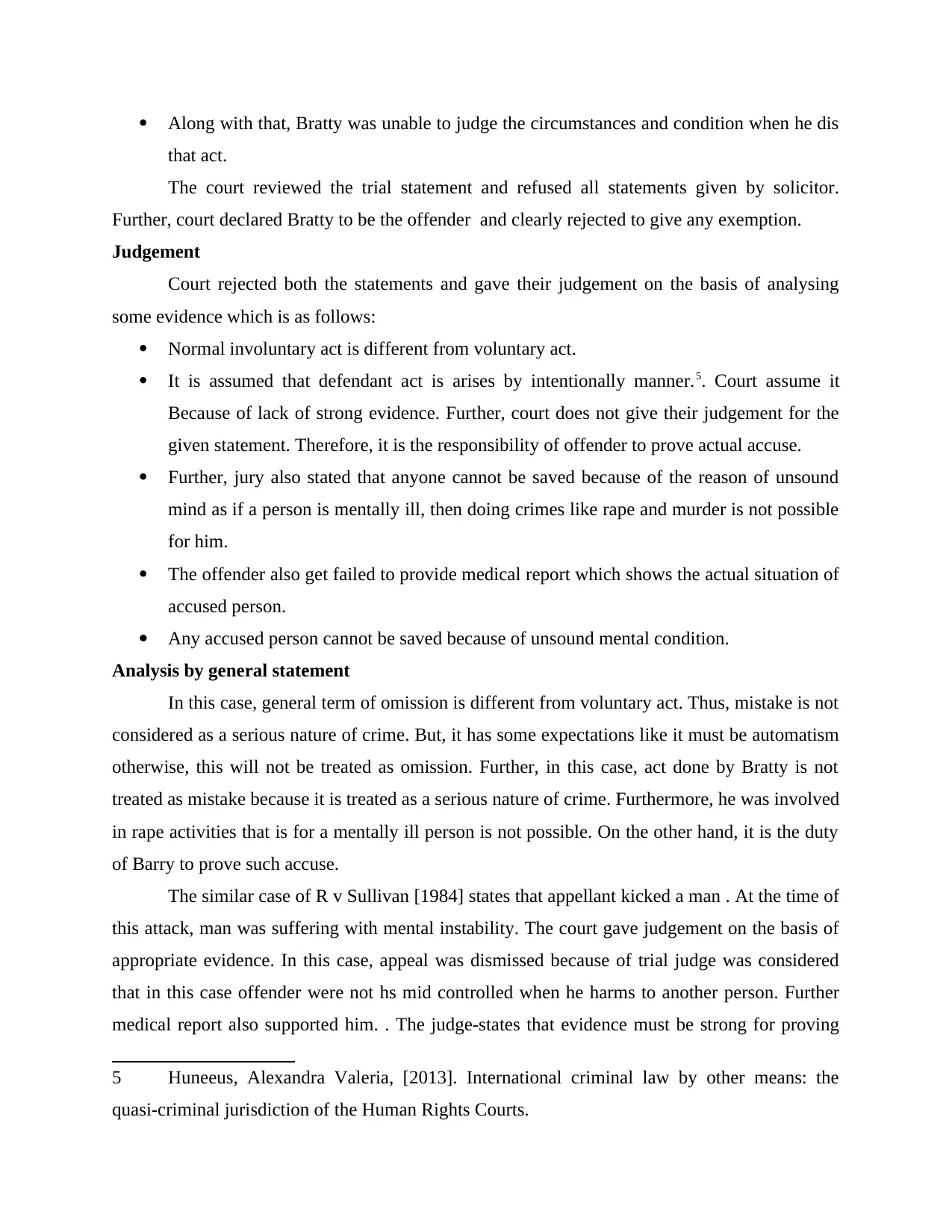
Along with that, Bratty was unable to judge the circumstances and condition when he dis
that act.
The court reviewed the trial statement and refused all statements given by solicitor.
Further, court declared Bratty to be the offender and clearly rejected to give any exemption.
Judgement
Court rejected both the statements and gave their judgement on the basis of analysing
some evidence which is as follows:
Normal involuntary act is different from voluntary act.
It is assumed that defendant act is arises by intentionally manner.5. Court assume it
Because of lack of strong evidence. Further, court does not give their judgement for the
given statement. Therefore, it is the responsibility of offender to prove actual accuse.
Further, jury also stated that anyone cannot be saved because of the reason of unsound
mind as if a person is mentally ill, then doing crimes like rape and murder is not possible
for him.
The offender also get failed to provide medical report which shows the actual situation of
accused person.
Any accused person cannot be saved because of unsound mental condition.
Analysis by general statement
In this case, general term of omission is different from voluntary act. Thus, mistake is not
considered as a serious nature of crime. But, it has some expectations like it must be automatism
otherwise, this will not be treated as omission. Further, in this case, act done by Bratty is not
treated as mistake because it is treated as a serious nature of crime. Furthermore, he was involved
in rape activities that is for a mentally ill person is not possible. On the other hand, it is the duty
of Barry to prove such accuse.
The similar case of R v Sullivan [1984] states that appellant kicked a man . At the time of
this attack, man was suffering with mental instability. The court gave judgement on the basis of
appropriate evidence. In this case, appeal was dismissed because of trial judge was considered
that in this case offender were not hs mid controlled when he harms to another person. Further
medical report also supported him. . The judge-states that evidence must be strong for proving
5 Huneeus, Alexandra Valeria, [2013]. International criminal law by other means: the
quasi-criminal jurisdiction of the Human Rights Courts.
that act.
The court reviewed the trial statement and refused all statements given by solicitor.
Further, court declared Bratty to be the offender and clearly rejected to give any exemption.
Judgement
Court rejected both the statements and gave their judgement on the basis of analysing
some evidence which is as follows:
Normal involuntary act is different from voluntary act.
It is assumed that defendant act is arises by intentionally manner.5. Court assume it
Because of lack of strong evidence. Further, court does not give their judgement for the
given statement. Therefore, it is the responsibility of offender to prove actual accuse.
Further, jury also stated that anyone cannot be saved because of the reason of unsound
mind as if a person is mentally ill, then doing crimes like rape and murder is not possible
for him.
The offender also get failed to provide medical report which shows the actual situation of
accused person.
Any accused person cannot be saved because of unsound mental condition.
Analysis by general statement
In this case, general term of omission is different from voluntary act. Thus, mistake is not
considered as a serious nature of crime. But, it has some expectations like it must be automatism
otherwise, this will not be treated as omission. Further, in this case, act done by Bratty is not
treated as mistake because it is treated as a serious nature of crime. Furthermore, he was involved
in rape activities that is for a mentally ill person is not possible. On the other hand, it is the duty
of Barry to prove such accuse.
The similar case of R v Sullivan [1984] states that appellant kicked a man . At the time of
this attack, man was suffering with mental instability. The court gave judgement on the basis of
appropriate evidence. In this case, appeal was dismissed because of trial judge was considered
that in this case offender were not hs mid controlled when he harms to another person. Further
medical report also supported him. . The judge-states that evidence must be strong for proving
5 Huneeus, Alexandra Valeria, [2013]. International criminal law by other means: the
quasi-criminal jurisdiction of the Human Rights Courts.
⊘ This is a preview!⊘
Do you want full access?
Subscribe today to unlock all pages.

Trusted by 1+ million students worldwide
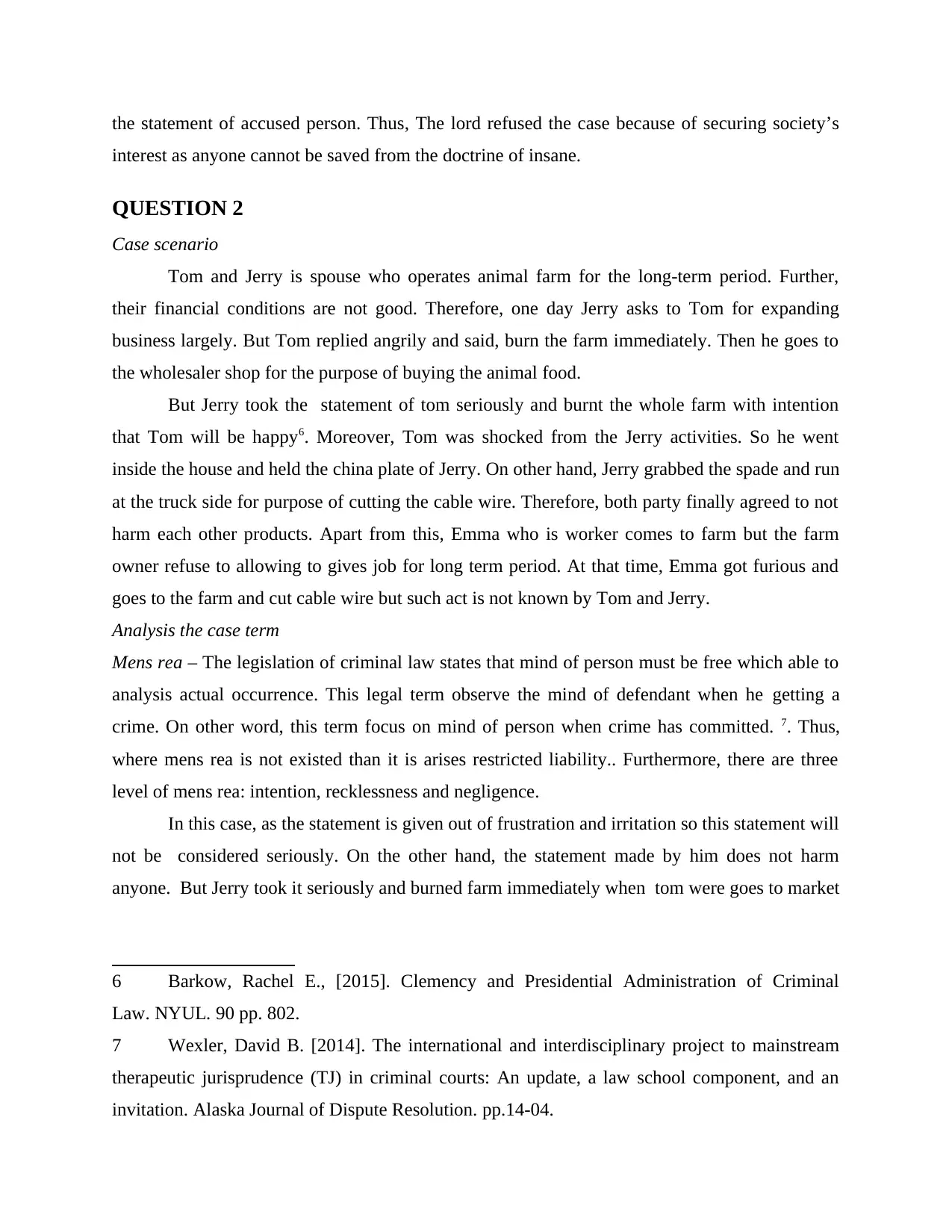
the statement of accused person. Thus, The lord refused the case because of securing society’s
interest as anyone cannot be saved from the doctrine of insane.
QUESTION 2
Case scenario
Tom and Jerry is spouse who operates animal farm for the long-term period. Further,
their financial conditions are not good. Therefore, one day Jerry asks to Tom for expanding
business largely. But Tom replied angrily and said, burn the farm immediately. Then he goes to
the wholesaler shop for the purpose of buying the animal food.
But Jerry took the statement of tom seriously and burnt the whole farm with intention
that Tom will be happy6. Moreover, Tom was shocked from the Jerry activities. So he went
inside the house and held the china plate of Jerry. On other hand, Jerry grabbed the spade and run
at the truck side for purpose of cutting the cable wire. Therefore, both party finally agreed to not
harm each other products. Apart from this, Emma who is worker comes to farm but the farm
owner refuse to allowing to gives job for long term period. At that time, Emma got furious and
goes to the farm and cut cable wire but such act is not known by Tom and Jerry.
Analysis the case term
Mens rea – The legislation of criminal law states that mind of person must be free which able to
analysis actual occurrence. This legal term observe the mind of defendant when he getting a
crime. On other word, this term focus on mind of person when crime has committed. 7. Thus,
where mens rea is not existed than it is arises restricted liability.. Furthermore, there are three
level of mens rea: intention, recklessness and negligence.
In this case, as the statement is given out of frustration and irritation so this statement will
not be considered seriously. On the other hand, the statement made by him does not harm
anyone. But Jerry took it seriously and burned farm immediately when tom were goes to market
6 Barkow, Rachel E., [2015]. Clemency and Presidential Administration of Criminal
Law. NYUL. 90 pp. 802.
7 Wexler, David B. [2014]. The international and interdisciplinary project to mainstream
therapeutic jurisprudence (TJ) in criminal courts: An update, a law school component, and an
invitation. Alaska Journal of Dispute Resolution. pp.14-04.
interest as anyone cannot be saved from the doctrine of insane.
QUESTION 2
Case scenario
Tom and Jerry is spouse who operates animal farm for the long-term period. Further,
their financial conditions are not good. Therefore, one day Jerry asks to Tom for expanding
business largely. But Tom replied angrily and said, burn the farm immediately. Then he goes to
the wholesaler shop for the purpose of buying the animal food.
But Jerry took the statement of tom seriously and burnt the whole farm with intention
that Tom will be happy6. Moreover, Tom was shocked from the Jerry activities. So he went
inside the house and held the china plate of Jerry. On other hand, Jerry grabbed the spade and run
at the truck side for purpose of cutting the cable wire. Therefore, both party finally agreed to not
harm each other products. Apart from this, Emma who is worker comes to farm but the farm
owner refuse to allowing to gives job for long term period. At that time, Emma got furious and
goes to the farm and cut cable wire but such act is not known by Tom and Jerry.
Analysis the case term
Mens rea – The legislation of criminal law states that mind of person must be free which able to
analysis actual occurrence. This legal term observe the mind of defendant when he getting a
crime. On other word, this term focus on mind of person when crime has committed. 7. Thus,
where mens rea is not existed than it is arises restricted liability.. Furthermore, there are three
level of mens rea: intention, recklessness and negligence.
In this case, as the statement is given out of frustration and irritation so this statement will
not be considered seriously. On the other hand, the statement made by him does not harm
anyone. But Jerry took it seriously and burned farm immediately when tom were goes to market
6 Barkow, Rachel E., [2015]. Clemency and Presidential Administration of Criminal
Law. NYUL. 90 pp. 802.
7 Wexler, David B. [2014]. The international and interdisciplinary project to mainstream
therapeutic jurisprudence (TJ) in criminal courts: An update, a law school component, and an
invitation. Alaska Journal of Dispute Resolution. pp.14-04.
Paraphrase This Document
Need a fresh take? Get an instant paraphrase of this document with our AI Paraphraser
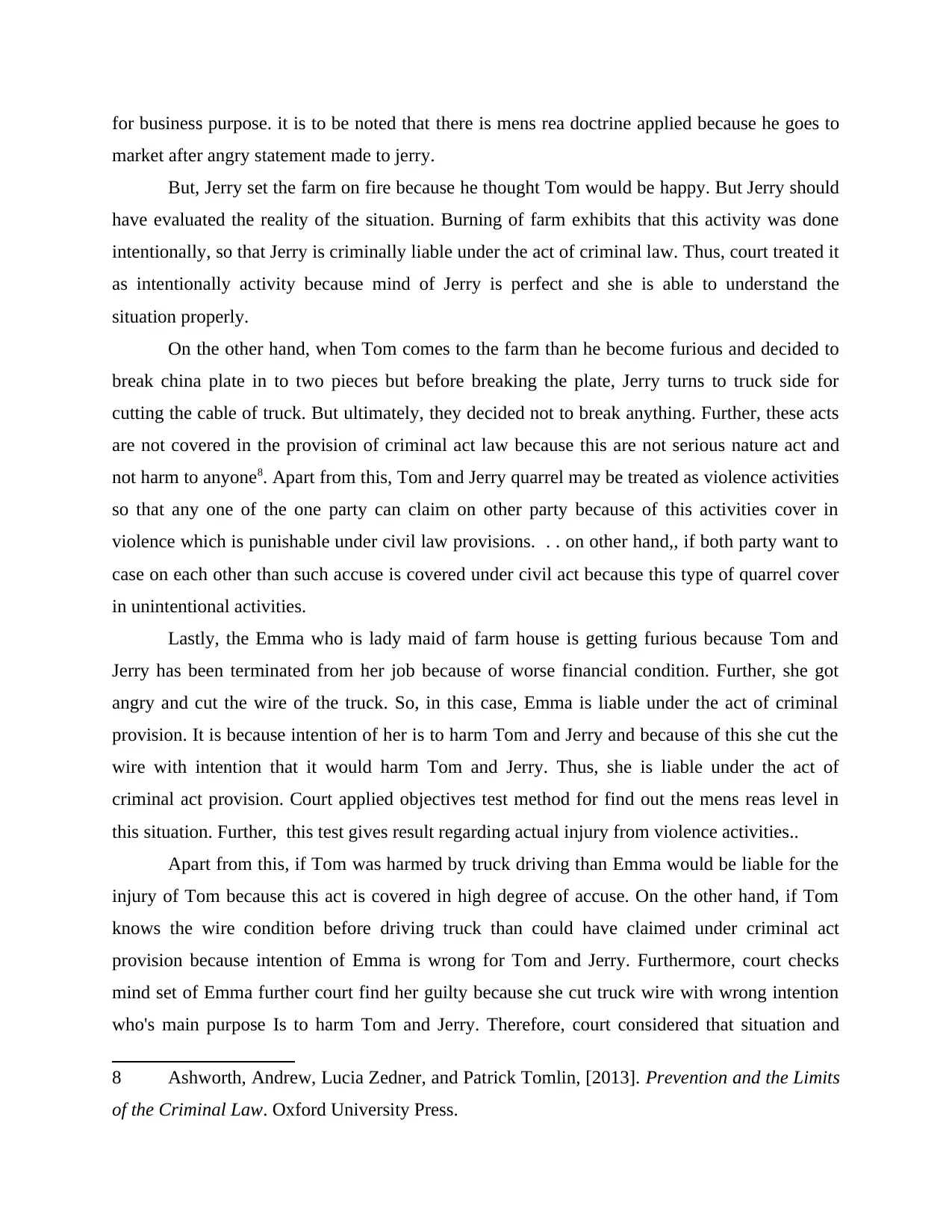
for business purpose. it is to be noted that there is mens rea doctrine applied because he goes to
market after angry statement made to jerry.
But, Jerry set the farm on fire because he thought Tom would be happy. But Jerry should
have evaluated the reality of the situation. Burning of farm exhibits that this activity was done
intentionally, so that Jerry is criminally liable under the act of criminal law. Thus, court treated it
as intentionally activity because mind of Jerry is perfect and she is able to understand the
situation properly.
On the other hand, when Tom comes to the farm than he become furious and decided to
break china plate in to two pieces but before breaking the plate, Jerry turns to truck side for
cutting the cable of truck. But ultimately, they decided not to break anything. Further, these acts
are not covered in the provision of criminal act law because this are not serious nature act and
not harm to anyone8. Apart from this, Tom and Jerry quarrel may be treated as violence activities
so that any one of the one party can claim on other party because of this activities cover in
violence which is punishable under civil law provisions. . . on other hand,, if both party want to
case on each other than such accuse is covered under civil act because this type of quarrel cover
in unintentional activities.
Lastly, the Emma who is lady maid of farm house is getting furious because Tom and
Jerry has been terminated from her job because of worse financial condition. Further, she got
angry and cut the wire of the truck. So, in this case, Emma is liable under the act of criminal
provision. It is because intention of her is to harm Tom and Jerry and because of this she cut the
wire with intention that it would harm Tom and Jerry. Thus, she is liable under the act of
criminal act provision. Court applied objectives test method for find out the mens reas level in
this situation. Further, this test gives result regarding actual injury from violence activities..
Apart from this, if Tom was harmed by truck driving than Emma would be liable for the
injury of Tom because this act is covered in high degree of accuse. On the other hand, if Tom
knows the wire condition before driving truck than could have claimed under criminal act
provision because intention of Emma is wrong for Tom and Jerry. Furthermore, court checks
mind set of Emma further court find her guilty because she cut truck wire with wrong intention
who's main purpose Is to harm Tom and Jerry. Therefore, court considered that situation and
8 Ashworth, Andrew, Lucia Zedner, and Patrick Tomlin, [2013]. Prevention and the Limits
of the Criminal Law. Oxford University Press.
market after angry statement made to jerry.
But, Jerry set the farm on fire because he thought Tom would be happy. But Jerry should
have evaluated the reality of the situation. Burning of farm exhibits that this activity was done
intentionally, so that Jerry is criminally liable under the act of criminal law. Thus, court treated it
as intentionally activity because mind of Jerry is perfect and she is able to understand the
situation properly.
On the other hand, when Tom comes to the farm than he become furious and decided to
break china plate in to two pieces but before breaking the plate, Jerry turns to truck side for
cutting the cable of truck. But ultimately, they decided not to break anything. Further, these acts
are not covered in the provision of criminal act law because this are not serious nature act and
not harm to anyone8. Apart from this, Tom and Jerry quarrel may be treated as violence activities
so that any one of the one party can claim on other party because of this activities cover in
violence which is punishable under civil law provisions. . . on other hand,, if both party want to
case on each other than such accuse is covered under civil act because this type of quarrel cover
in unintentional activities.
Lastly, the Emma who is lady maid of farm house is getting furious because Tom and
Jerry has been terminated from her job because of worse financial condition. Further, she got
angry and cut the wire of the truck. So, in this case, Emma is liable under the act of criminal
provision. It is because intention of her is to harm Tom and Jerry and because of this she cut the
wire with intention that it would harm Tom and Jerry. Thus, she is liable under the act of
criminal act provision. Court applied objectives test method for find out the mens reas level in
this situation. Further, this test gives result regarding actual injury from violence activities..
Apart from this, if Tom was harmed by truck driving than Emma would be liable for the
injury of Tom because this act is covered in high degree of accuse. On the other hand, if Tom
knows the wire condition before driving truck than could have claimed under criminal act
provision because intention of Emma is wrong for Tom and Jerry. Furthermore, court checks
mind set of Emma further court find her guilty because she cut truck wire with wrong intention
who's main purpose Is to harm Tom and Jerry. Therefore, court considered that situation and
8 Ashworth, Andrew, Lucia Zedner, and Patrick Tomlin, [2013]. Prevention and the Limits
of the Criminal Law. Oxford University Press.
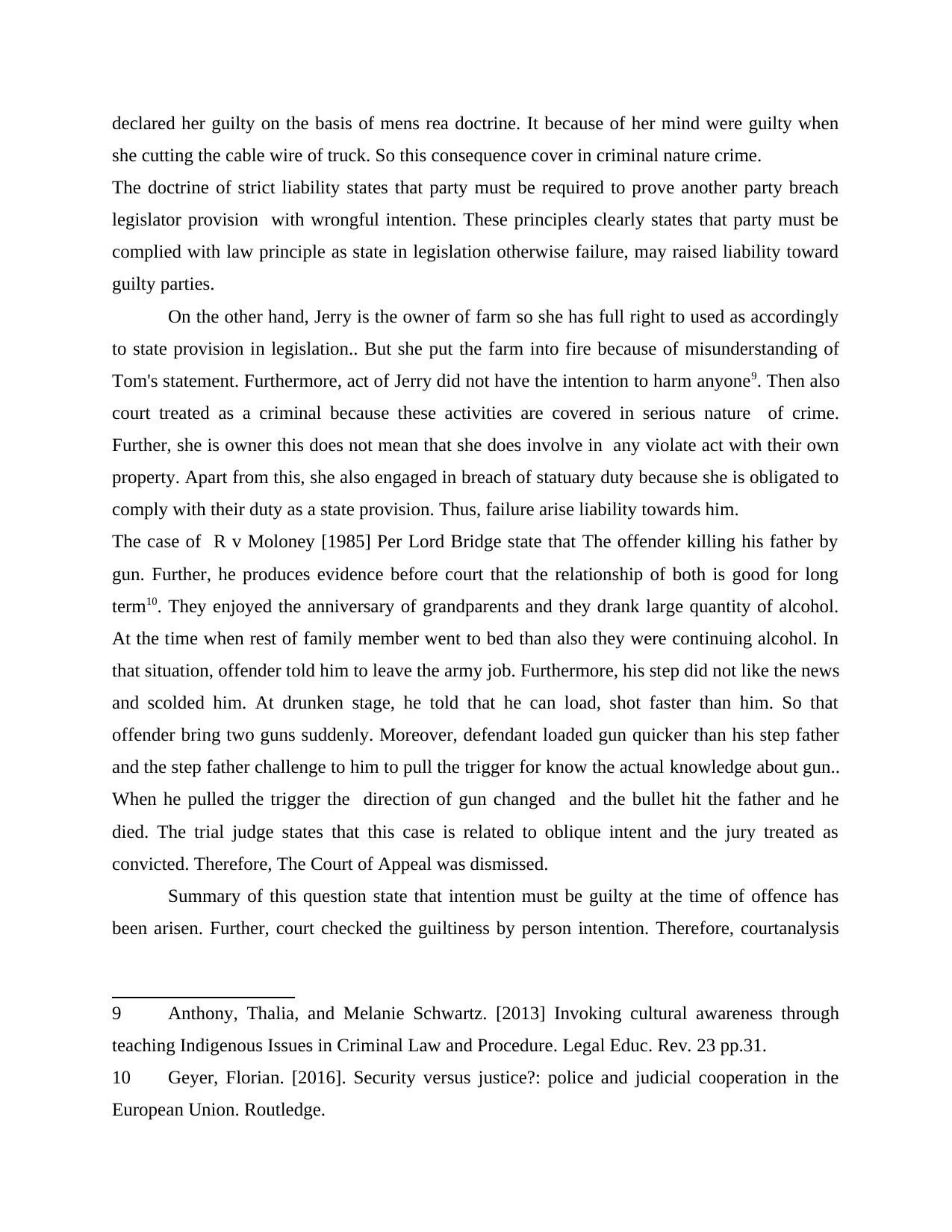
declared her guilty on the basis of mens rea doctrine. It because of her mind were guilty when
she cutting the cable wire of truck. So this consequence cover in criminal nature crime.
The doctrine of strict liability states that party must be required to prove another party breach
legislator provision with wrongful intention. These principles clearly states that party must be
complied with law principle as state in legislation otherwise failure, may raised liability toward
guilty parties.
On the other hand, Jerry is the owner of farm so she has full right to used as accordingly
to state provision in legislation.. But she put the farm into fire because of misunderstanding of
Tom's statement. Furthermore, act of Jerry did not have the intention to harm anyone9. Then also
court treated as a criminal because these activities are covered in serious nature of crime.
Further, she is owner this does not mean that she does involve in any violate act with their own
property. Apart from this, she also engaged in breach of statuary duty because she is obligated to
comply with their duty as a state provision. Thus, failure arise liability towards him.
The case of R v Moloney [1985] Per Lord Bridge state that The offender killing his father by
gun. Further, he produces evidence before court that the relationship of both is good for long
term10. They enjoyed the anniversary of grandparents and they drank large quantity of alcohol.
At the time when rest of family member went to bed than also they were continuing alcohol. In
that situation, offender told him to leave the army job. Furthermore, his step did not like the news
and scolded him. At drunken stage, he told that he can load, shot faster than him. So that
offender bring two guns suddenly. Moreover, defendant loaded gun quicker than his step father
and the step father challenge to him to pull the trigger for know the actual knowledge about gun..
When he pulled the trigger the direction of gun changed and the bullet hit the father and he
died. The trial judge states that this case is related to oblique intent and the jury treated as
convicted. Therefore, The Court of Appeal was dismissed.
Summary of this question state that intention must be guilty at the time of offence has
been arisen. Further, court checked the guiltiness by person intention. Therefore, courtanalysis
9 Anthony, Thalia, and Melanie Schwartz. [2013] Invoking cultural awareness through
teaching Indigenous Issues in Criminal Law and Procedure. Legal Educ. Rev. 23 pp.31.
10 Geyer, Florian. [2016]. Security versus justice?: police and judicial cooperation in the
European Union. Routledge.
she cutting the cable wire of truck. So this consequence cover in criminal nature crime.
The doctrine of strict liability states that party must be required to prove another party breach
legislator provision with wrongful intention. These principles clearly states that party must be
complied with law principle as state in legislation otherwise failure, may raised liability toward
guilty parties.
On the other hand, Jerry is the owner of farm so she has full right to used as accordingly
to state provision in legislation.. But she put the farm into fire because of misunderstanding of
Tom's statement. Furthermore, act of Jerry did not have the intention to harm anyone9. Then also
court treated as a criminal because these activities are covered in serious nature of crime.
Further, she is owner this does not mean that she does involve in any violate act with their own
property. Apart from this, she also engaged in breach of statuary duty because she is obligated to
comply with their duty as a state provision. Thus, failure arise liability towards him.
The case of R v Moloney [1985] Per Lord Bridge state that The offender killing his father by
gun. Further, he produces evidence before court that the relationship of both is good for long
term10. They enjoyed the anniversary of grandparents and they drank large quantity of alcohol.
At the time when rest of family member went to bed than also they were continuing alcohol. In
that situation, offender told him to leave the army job. Furthermore, his step did not like the news
and scolded him. At drunken stage, he told that he can load, shot faster than him. So that
offender bring two guns suddenly. Moreover, defendant loaded gun quicker than his step father
and the step father challenge to him to pull the trigger for know the actual knowledge about gun..
When he pulled the trigger the direction of gun changed and the bullet hit the father and he
died. The trial judge states that this case is related to oblique intent and the jury treated as
convicted. Therefore, The Court of Appeal was dismissed.
Summary of this question state that intention must be guilty at the time of offence has
been arisen. Further, court checked the guiltiness by person intention. Therefore, courtanalysis
9 Anthony, Thalia, and Melanie Schwartz. [2013] Invoking cultural awareness through
teaching Indigenous Issues in Criminal Law and Procedure. Legal Educ. Rev. 23 pp.31.
10 Geyer, Florian. [2016]. Security versus justice?: police and judicial cooperation in the
European Union. Routledge.
⊘ This is a preview!⊘
Do you want full access?
Subscribe today to unlock all pages.

Trusted by 1+ million students worldwide
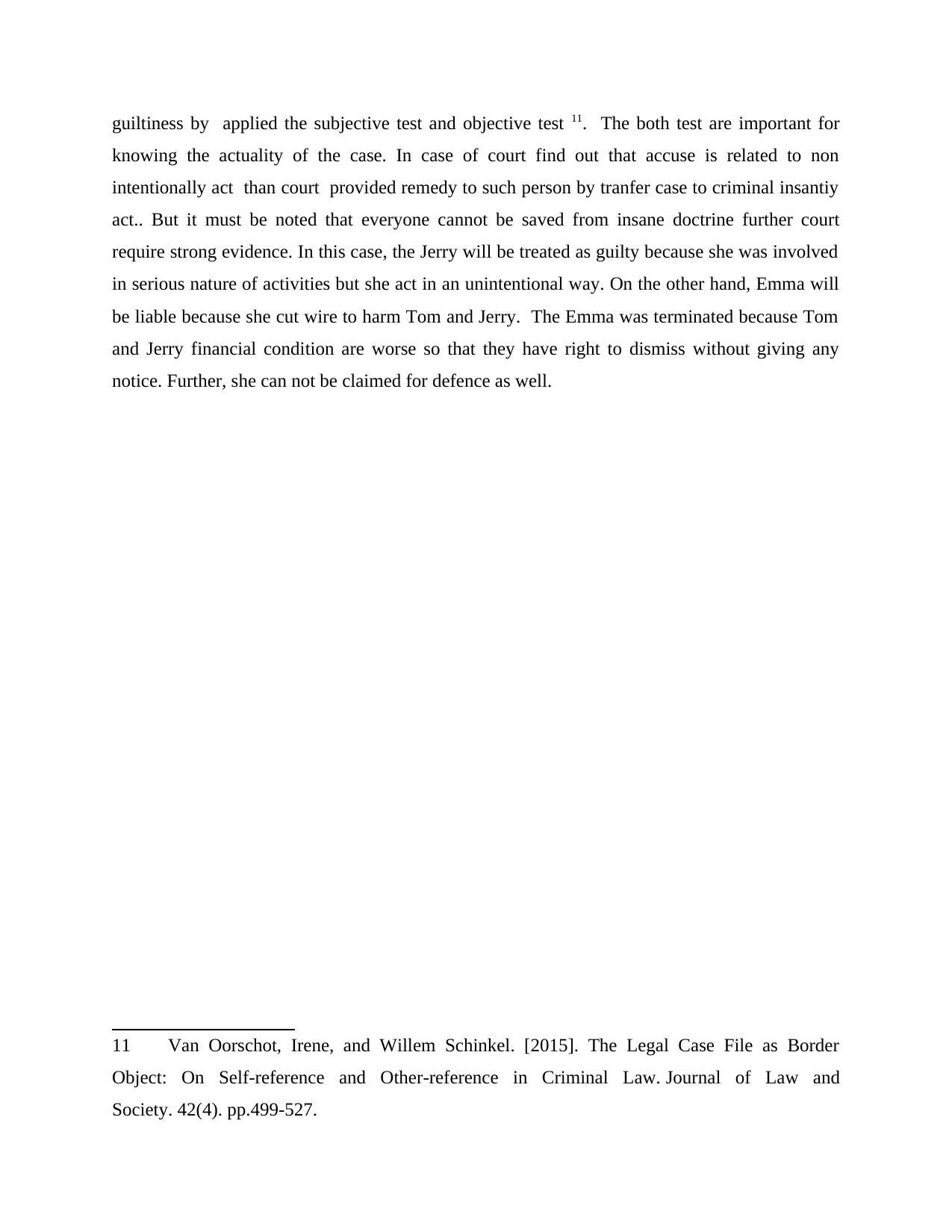
guiltiness by applied the subjective test and objective test 11. The both test are important for
knowing the actuality of the case. In case of court find out that accuse is related to non
intentionally act than court provided remedy to such person by tranfer case to criminal insantiy
act.. But it must be noted that everyone cannot be saved from insane doctrine further court
require strong evidence. In this case, the Jerry will be treated as guilty because she was involved
in serious nature of activities but she act in an unintentional way. On the other hand, Emma will
be liable because she cut wire to harm Tom and Jerry. The Emma was terminated because Tom
and Jerry financial condition are worse so that they have right to dismiss without giving any
notice. Further, she can not be claimed for defence as well.
11 Van Oorschot, Irene, and Willem Schinkel. [2015]. The Legal Case File as Border
Object: On Self‐reference and Other‐reference in Criminal Law. Journal of Law and
Society. 42(4). pp.499-527.
knowing the actuality of the case. In case of court find out that accuse is related to non
intentionally act than court provided remedy to such person by tranfer case to criminal insantiy
act.. But it must be noted that everyone cannot be saved from insane doctrine further court
require strong evidence. In this case, the Jerry will be treated as guilty because she was involved
in serious nature of activities but she act in an unintentional way. On the other hand, Emma will
be liable because she cut wire to harm Tom and Jerry. The Emma was terminated because Tom
and Jerry financial condition are worse so that they have right to dismiss without giving any
notice. Further, she can not be claimed for defence as well.
11 Van Oorschot, Irene, and Willem Schinkel. [2015]. The Legal Case File as Border
Object: On Self‐reference and Other‐reference in Criminal Law. Journal of Law and
Society. 42(4). pp.499-527.
Paraphrase This Document
Need a fresh take? Get an instant paraphrase of this document with our AI Paraphraser
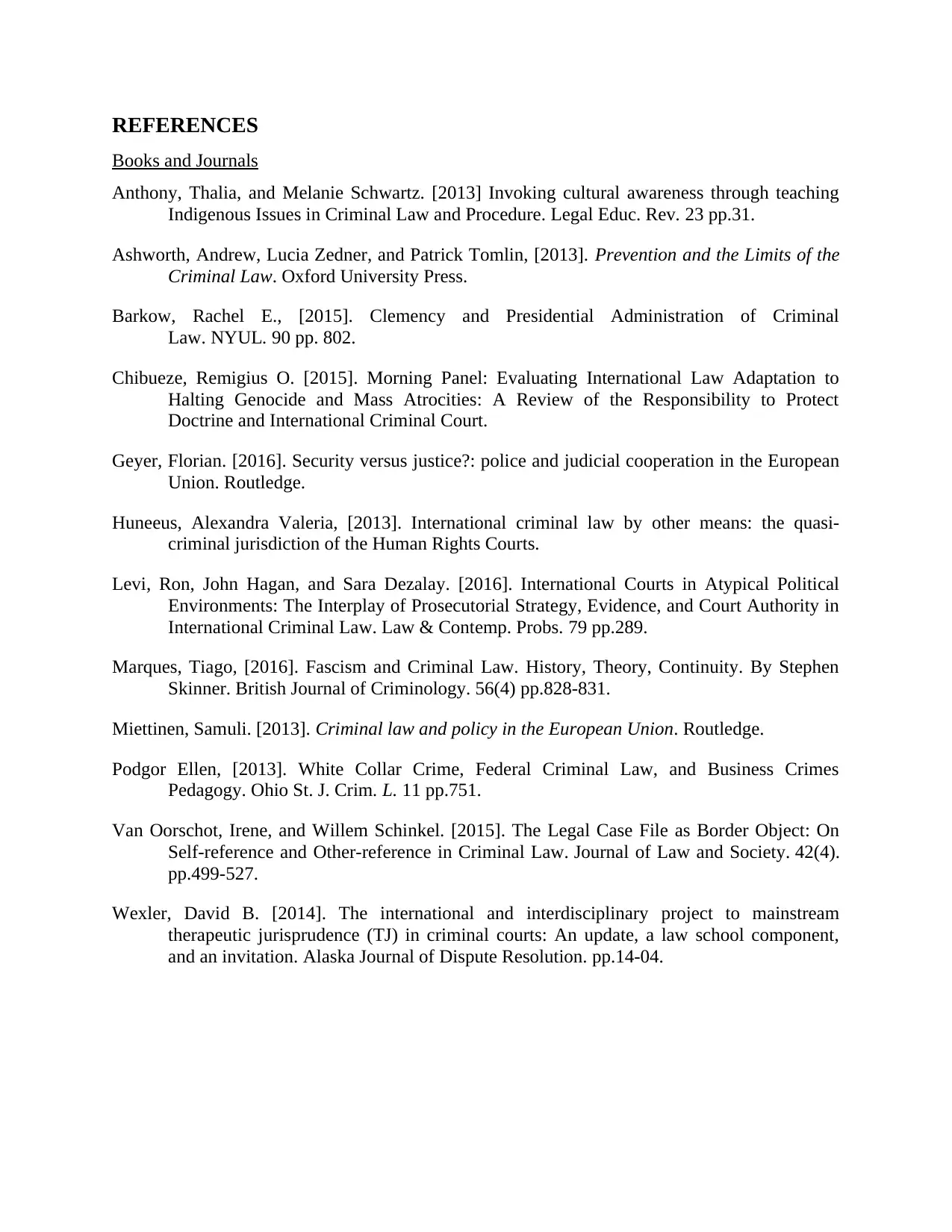
REFERENCES
Books and Journals
Anthony, Thalia, and Melanie Schwartz. [2013] Invoking cultural awareness through teaching
Indigenous Issues in Criminal Law and Procedure. Legal Educ. Rev. 23 pp.31.
Ashworth, Andrew, Lucia Zedner, and Patrick Tomlin, [2013]. Prevention and the Limits of the
Criminal Law. Oxford University Press.
Barkow, Rachel E., [2015]. Clemency and Presidential Administration of Criminal
Law. NYUL. 90 pp. 802.
Chibueze, Remigius O. [2015]. Morning Panel: Evaluating International Law Adaptation to
Halting Genocide and Mass Atrocities: A Review of the Responsibility to Protect
Doctrine and International Criminal Court.
Geyer, Florian. [2016]. Security versus justice?: police and judicial cooperation in the European
Union. Routledge.
Huneeus, Alexandra Valeria, [2013]. International criminal law by other means: the quasi-
criminal jurisdiction of the Human Rights Courts.
Levi, Ron, John Hagan, and Sara Dezalay. [2016]. International Courts in Atypical Political
Environments: The Interplay of Prosecutorial Strategy, Evidence, and Court Authority in
International Criminal Law. Law & Contemp. Probs. 79 pp.289.
Marques, Tiago, [2016]. Fascism and Criminal Law. History, Theory, Continuity. By Stephen
Skinner. British Journal of Criminology. 56(4) pp.828-831.
Miettinen, Samuli. [2013]. Criminal law and policy in the European Union. Routledge.
Podgor Ellen, [2013]. White Collar Crime, Federal Criminal Law, and Business Crimes
Pedagogy. Ohio St. J. Crim. L. 11 pp.751.
Van Oorschot, Irene, and Willem Schinkel. [2015]. The Legal Case File as Border Object: On
Self‐reference and Other‐reference in Criminal Law. Journal of Law and Society. 42(4).
pp.499-527.
Wexler, David B. [2014]. The international and interdisciplinary project to mainstream
therapeutic jurisprudence (TJ) in criminal courts: An update, a law school component,
and an invitation. Alaska Journal of Dispute Resolution. pp.14-04.
Books and Journals
Anthony, Thalia, and Melanie Schwartz. [2013] Invoking cultural awareness through teaching
Indigenous Issues in Criminal Law and Procedure. Legal Educ. Rev. 23 pp.31.
Ashworth, Andrew, Lucia Zedner, and Patrick Tomlin, [2013]. Prevention and the Limits of the
Criminal Law. Oxford University Press.
Barkow, Rachel E., [2015]. Clemency and Presidential Administration of Criminal
Law. NYUL. 90 pp. 802.
Chibueze, Remigius O. [2015]. Morning Panel: Evaluating International Law Adaptation to
Halting Genocide and Mass Atrocities: A Review of the Responsibility to Protect
Doctrine and International Criminal Court.
Geyer, Florian. [2016]. Security versus justice?: police and judicial cooperation in the European
Union. Routledge.
Huneeus, Alexandra Valeria, [2013]. International criminal law by other means: the quasi-
criminal jurisdiction of the Human Rights Courts.
Levi, Ron, John Hagan, and Sara Dezalay. [2016]. International Courts in Atypical Political
Environments: The Interplay of Prosecutorial Strategy, Evidence, and Court Authority in
International Criminal Law. Law & Contemp. Probs. 79 pp.289.
Marques, Tiago, [2016]. Fascism and Criminal Law. History, Theory, Continuity. By Stephen
Skinner. British Journal of Criminology. 56(4) pp.828-831.
Miettinen, Samuli. [2013]. Criminal law and policy in the European Union. Routledge.
Podgor Ellen, [2013]. White Collar Crime, Federal Criminal Law, and Business Crimes
Pedagogy. Ohio St. J. Crim. L. 11 pp.751.
Van Oorschot, Irene, and Willem Schinkel. [2015]. The Legal Case File as Border Object: On
Self‐reference and Other‐reference in Criminal Law. Journal of Law and Society. 42(4).
pp.499-527.
Wexler, David B. [2014]. The international and interdisciplinary project to mainstream
therapeutic jurisprudence (TJ) in criminal courts: An update, a law school component,
and an invitation. Alaska Journal of Dispute Resolution. pp.14-04.
1 out of 11
Related Documents
Your All-in-One AI-Powered Toolkit for Academic Success.
+13062052269
info@desklib.com
Available 24*7 on WhatsApp / Email
![[object Object]](/_next/static/media/star-bottom.7253800d.svg)
Unlock your academic potential
Copyright © 2020–2026 A2Z Services. All Rights Reserved. Developed and managed by ZUCOL.





